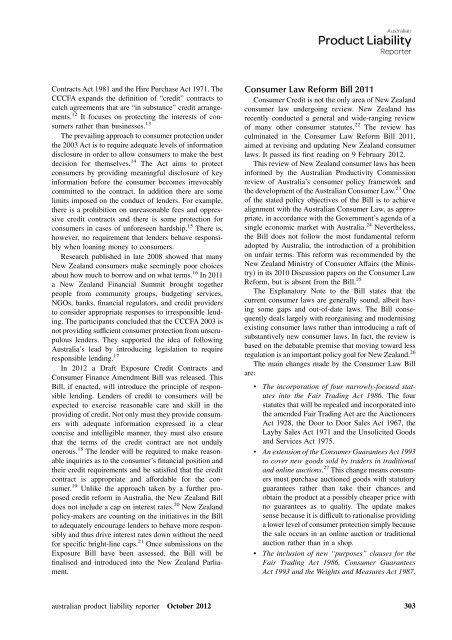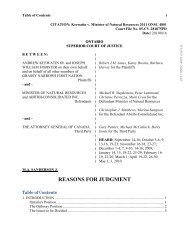Canadian case law: Arora et al v Whirlpool Canada LP and ...
Canadian case law: Arora et al v Whirlpool Canada LP and ...
Canadian case law: Arora et al v Whirlpool Canada LP and ...
- No tags were found...
You also want an ePaper? Increase the reach of your titles
YUMPU automatically turns print PDFs into web optimized ePapers that Google loves.
Contracts Act 1981 <strong>and</strong> the Hire Purchase Act 1971. TheCCCFA exp<strong>and</strong>s the definition of “credit” contracts tocatch agreements that are “in substance” credit arrangements.12 It focuses on protecting the interests of consumersrather than businesses. 13The prevailing approach to consumer protection underthe 2003 Act is to require adequate levels of informationdisclosure in order to <strong>al</strong>low consumers to make the bestdecision for themselves. 14 The Act aims to protectconsumers by providing meaningful disclosure of keyinformation before the consumer becomes irrevocablycommitted to the contract. In addition there are somelimits imposed on the conduct of lenders. For example,there is a prohibition on unreasonable fees <strong>and</strong> oppressivecredit contracts <strong>and</strong> there is some protection forconsumers in <strong>case</strong>s of unforeseen hardship. 15 There is,however, no requirement that lenders behave responsiblywhen loaning money to consumers.Research published in late 2008 showed that manyNew Ze<strong>al</strong><strong>and</strong> consumers make seemingly poor choicesabout how much to borrow <strong>and</strong> on what terms. 16 In 2011a New Ze<strong>al</strong><strong>and</strong> Financi<strong>al</strong> Summit brought tog<strong>et</strong>herpeople from community groups, budg<strong>et</strong>ing services,NGOs, banks, financi<strong>al</strong> regulators, <strong>and</strong> credit providersto consider appropriate responses to irresponsible lending.The participants concluded that the CCCFA 2003 isnot providing sufficient consumer protection from unscrupulouslenders. They supported the idea of followingAustr<strong>al</strong>ia’s lead by introducing legislation to requireresponsible lending. 17In 2012 a Draft Exposure Credit Contracts <strong>and</strong>Consumer Finance Amendment Bill was released. ThisBill, if enacted, will introduce the principle of responsiblelending. Lenders of credit to consumers will beexpected to exercise reasonable care <strong>and</strong> skill in theproviding of credit. Not only must they provide consumerswith adequate information expressed in a clearconcise <strong>and</strong> intelligible manner, they must <strong>al</strong>so ensur<strong>et</strong>hat the terms of the credit contract are not undulyonerous. 18 The lender will be required to make reasonableinquiries as to the consumer’s financi<strong>al</strong> position <strong>and</strong>their credit requirements <strong>and</strong> be satisfied that the creditcontract is appropriate <strong>and</strong> affordable for the consumer.19 Unlike the approach taken by a further proposedcredit reform in Austr<strong>al</strong>ia, the New Ze<strong>al</strong><strong>and</strong> Billdoes not include a cap on interest rates. 20 New Ze<strong>al</strong><strong>and</strong>policy-makers are counting on the initiatives in the Billto adequately encourage lenders to behave more responsibly<strong>and</strong> thus drive interest rates down without the needfor specific bright-line caps. 21 Once submissions on theExposure Bill have been assessed, the Bill will befin<strong>al</strong>ised <strong>and</strong> introduced into the New Ze<strong>al</strong><strong>and</strong> Parliament.Consumer Law Reform Bill 2011Consumer Credit is not the only area of New Ze<strong>al</strong><strong>and</strong>consumer <strong>law</strong> undergoing review. New Ze<strong>al</strong><strong>and</strong> hasrecently conducted a gener<strong>al</strong> <strong>and</strong> wide-ranging reviewof many other consumer statutes. 22 The review hasculminated in the Consumer Law Reform Bill 2011,aimed at revising <strong>and</strong> updating New Ze<strong>al</strong><strong>and</strong> consumer<strong>law</strong>s. It passed its first reading on 9 February 2012.This review of New Ze<strong>al</strong><strong>and</strong> consumer <strong>law</strong>s has beeninformed by the Austr<strong>al</strong>ian Productivity Commissionreview of Austr<strong>al</strong>ia’s consumer policy framework <strong>and</strong>the development of the Austr<strong>al</strong>ian Consumer Law. 23 Oneof the stated policy objectives of the Bill is to achieve<strong>al</strong>ignment with the Austr<strong>al</strong>ian Consumer Law, as appropriate,in accordance with the Government’s agenda of asingle economic mark<strong>et</strong> with Austr<strong>al</strong>ia. 24 Nevertheless,the Bill does not follow the most fundament<strong>al</strong> reformadopted by Austr<strong>al</strong>ia, the introduction of a prohibitionon unfair terms. This reform was recommended by theNew Ze<strong>al</strong><strong>and</strong> Ministry of Consumer Affairs (the Ministry)in its 2010 Discussion papers on the Consumer LawReform, but is absent from the Bill. 25The Explanatory Note to the Bill states that thecurrent consumer <strong>law</strong>s are gener<strong>al</strong>ly sound, <strong>al</strong>beit havingsome gaps <strong>and</strong> out-of-date <strong>law</strong>s. The Bill consequentlyde<strong>al</strong>s largely with reorganising <strong>and</strong> modernisingexisting consumer <strong>law</strong>s rather than introducing a raft ofsubstantively new consumer <strong>law</strong>s. In fact, the review isbased on the debatable premise that moving toward lessregulation is an important policy go<strong>al</strong> for New Ze<strong>al</strong><strong>and</strong>. 26The main changes made by the Consumer Law Billare:• The incorporation of four narrowly-focused statutesinto the Fair Trading Act 1986. The fourstatutes that will be repe<strong>al</strong>ed <strong>and</strong> incorporated intothe amended Fair Trading Act are the AuctioneersAct 1928, the Door to Door S<strong>al</strong>es Act 1967, theLayby S<strong>al</strong>es Act 1971 <strong>and</strong> the Unsolicited Goods<strong>and</strong> Services Act 1975.• An extension of the Consumer Guarantees Act 1993to cover new goods sold by traders in tradition<strong>al</strong><strong>and</strong> online auctions. 27 This change means consumersmust purchase auctioned goods with statutoryguarantees rather than take their chances <strong>and</strong>obtain the product at a possibly cheaper price withno guarantees as to qu<strong>al</strong>ity. The update makessense because it is difficult to ration<strong>al</strong>ise providinga lower level of consumer protection simply becaus<strong>et</strong>he s<strong>al</strong>e occurs in an online auction or tradition<strong>al</strong>auction rather than in a shop.• The inclusion of new “purposes” clauses for theFair Trading Act 1986, Consumer GuaranteesAct 1993 <strong>and</strong> the Weights <strong>and</strong> Measures Act 1987.austr<strong>al</strong>ian product liability reporter October 2012 303
















